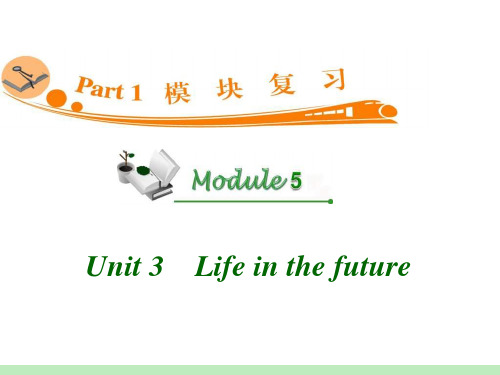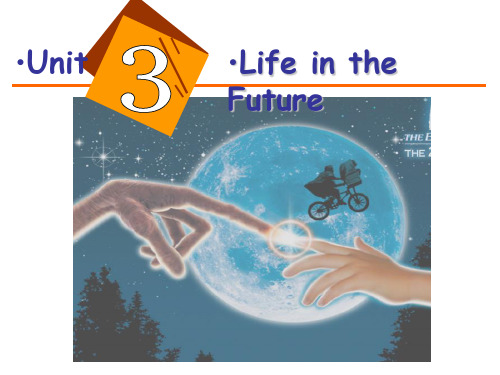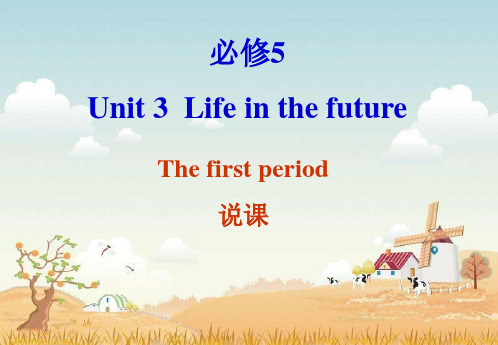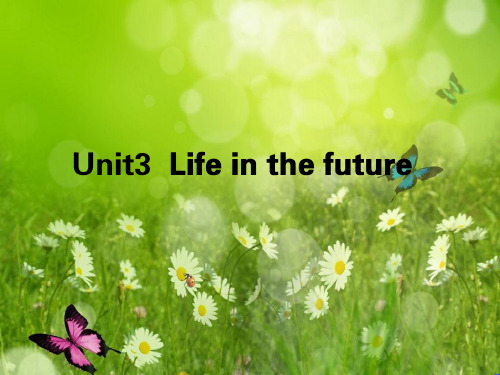Unit 3 Life in the future 时 写作复习课
- 格式:doc
- 大小:18.73 KB
- 文档页数:4
![人教新课标英语第一轮模块复习-必修五 Unit 3 Life in the future[1]](https://img.taocdn.com/s1/m/0ca7ade219e8b8f67c1cb92f.png)





⾼中英语-unit-3-Life-In-the-Future-全单元教案⾼⼆上学期第三次教案设计⼈:Unit 3 Life In the FuturePeriod 1 & 2 Warming Up & Pre-reading, ReadingTeaching Goals:1.To illustrate Ss’ imagination of future life.2.To arouse Ss to pay more attention to the problems that probably appeared in thefuture life.3.To make Ss know the difference of life between the past, present and future. Teaching Procedures:Step 1 Leading-inPurpose: To talk about past and future changes of life.1. Group workLet Ss discuss the questions in groups of four.(1)How do you usually get to school?(2)Where do you live, in a city or in the countryside?(3)Where would you like to live in the future?(4)Do you live in a flat or a house?(5)Do you have a room of you won? Can you describe the room in the picture?(6)What kind of housing would you like to have in the future?(7)What would you like to have in your room?(8)What can we use to build houses? (brick, stone , steel , glass, ice, wood , plasticbamboo, …)2. ConclusionThis unit introduces what life in the future might be like to Ss. By discussing and answering the questions above can make Ss have a general understanding of the present and future life and can also illustrate Ss’ imagination about the future life. Step 2. Warming Up1. Pair workIn pairs let Ss list the changes in housing, transport, jobs, families and education will happen in the next century.2. Individual workAccording to the result of the above Pair work, fill in the chart.Step 3. Pre-reading1. Pair workAsk Ss to discuss the following questions in pairs.(1)Make a list of the problems human beings are facing today.(2) What problems do you think people will have overcome in one thousand years? Which ones do you think will still exist inAD 3008?Suggested Answers:①The first problem I would like to point out is the decline of morality.(道德沦丧)②The second problem is the racial bias problem. (种族歧视)③The third problem , which is a most serious problem , is the rapid depletion of resources on the Earth. (资源匮乏)④Now I come to the fourth problem, the problem of the large gap between the poor and the rich . (贫富悬殊)⑤The fifth problem is the pollution problem.(环境恶化)⑥Now I would like to talk about the sixth problem, the expensive arms race problem. (军备竞争)。
Unit 3 Life in the future 第七课时写作复习课
第七课时写作复习课
第一步检查作业
1. Ask the students to exchange their compositions about the school life in 1000 years, and check with each other. In this way they can enlarge their vocabulary and learn something useful from each other. While they are checking their compositions, the teacher should give them necessary help, and find the common mistakes.
2. Ask 3-4 students to correct their common mistakes.
3. Evaluate the students' work, and ask a question:
What have you learned from your partner?
第二步听写单词、短语。
impression surrounding switch agency lack optimistic previous constant constantly swift swiftly extraordinary extraordinarily remind remind…of… assist assist in require press bend bent lose/catch sight of take up sweep up
第三步结合 Summing Up (P24)和 Checking Yourself(P61)复习本单元所学知识。
随堂小测
Ⅰ. 用所给词的适当形式填空:
1. His speech was _______ (constant)interrupted by applause.
2. Most of the children at the school do not live in the town, but come from the _______ (surround) countryside.
3. He just ______ (lack) a little confidence.
4. The local police took _______ (swiftly) action against the squatters.
5. The boat is ten metres in _______(long).
6. You are ______ (require ) by law to stop your car after an accident.
7. Teachers can't give pupils any _______ (assist) in exams.
8. I rang Jill and _______ (remind) her that the conference had been cancelled.
9. I had posted the card two months _______ (previous).
10. I didn't get much of an _______ (impress) of the place because it was dark when we drove through it.
(Keys: 1.constantly 2. surrounding 3. lacks 4. swift 5. length 6. required 7. assistance 8. reminded 9. previously 10. impression)
Ⅱ. 复习过去分词用作定语和状语的用法
根据句意从每小题所给的 A、B、C、D 四个选项中选择最佳答案:
1.______ some officials, Napoleon inspected his army.
A. Followed
B. Followed by
C. Being followed
D. having been followed by
2. Most of the people _______ to the party were famous scientists.
A. invited
B. to invite
C. being invited
D. inviting
3. ________ more attention, the trees could have grown better.
A. Given
B. To give
C. Giving
D. Having given
4. ______ in thought, he almost ran into the car in front of him.
A. Losing
B. Having lost
C. Lost
D. To lose
5. The computer center, _______ last year, is very popular among the students in this school.
A. open
B. opening
C. having opened
D. opened
6. The Olympic Games, ______ in 776BC, didn't include women players until 1912.
A. first played
B. to be first played
C. first playing
D. to be first played
7.______ from space, the earth, with water ______ seventy percent of its surface, looks like a blue ball.
A. Seen, covered
B. Seen, covering
C. Seeing, covering
D. Seeing, covered
8. An ______ crowd is waiting for the film star.
A. excited
B. exciting
C. excite
D. excitedly
(Keys: 1.B 2.A 3.A 4.C 5.D 6.A 7.B 8.A)
第四步写作训练
完成 Writing Task(P60)要求描述准确,条理清晰。
1. 限时写作,双人合作,互改互评,发现问题,取长补短。
2. 利用投影仪投影 2-3 组学生的习作,提炼出精彩句子整理在笔记本上。
3. 根据学生的普遍问题或错误做出讲评。
第五步作业布置
1. Learning Tip (P24)使学生明确在讨论时记笔记的好处和方法。
2. 双人合作:听写单词、短语。
3.写一篇 100 词左右的短文,文体不限,但要注意使用过去分词。
同时,尽可能地使用下列单词、短语:impression, lack, surrounding, swiftly, previous, require, remind, assist, take up, lose
/catch sight of, etc.
【教学设计说明】
本单元注重了研究性学习,设计了一些情景、活动和开放型任务,以调动学生的学习积极性,使他们主动地参与到学习活动中,在活动中高效地学习,在完成学习任务的过程中不断地取得进步。
针对所设定的教学目标,每节课都要目的明确,重点突出,合理地分配时间,保证圆满地完成每节课的教学任务。
在课堂教学中,应该关注学生的学习过程,教师应通过创设各种听、说、读、写活动,在活动中观察和记录学生的表现和参与情况,对学生进行评价,同时,把教师评价与学生自评、互评相结合,使学生保持学习的兴趣。
同时,鼓励学生主动地学习,主动地发现问题,然后通过合作学习来
解决问题,变“要我学”为“我要学”,使学生在完成学习任务的同时体会到成功的喜悦。
在教学实践中,教师应根据学生的实际水平给以适当的指导和帮助,因材施教,使学生轻松地学习,不断地取得[1] [2] 下一页。